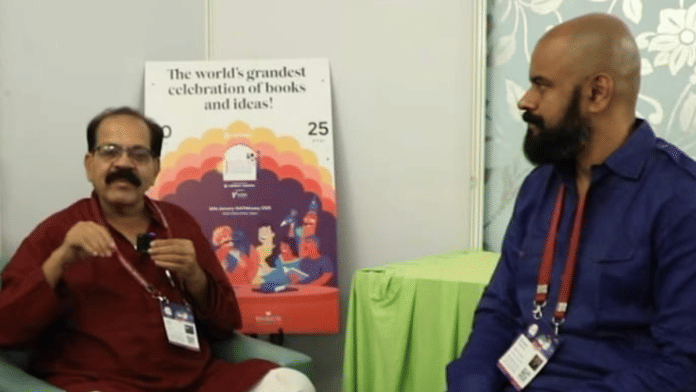Jaipur: Shahu Patole, author of Dalit Kitchens of Marathwada talks about how in her village “seven castes till the same earth, sowing the same grains and vegetables beneath shared skies and rains.”
“We all know the plates of the upper castes, but our meals remain in the shadows, unknown to the upper castes,” adds Patole, speaking to ThePrint on the sidelines of the Jaipur Literature Festival.
“Once the meal has been prepared in the kichen, food is divided—some deemed untouchable, others not. This is an outcome of a social hierarchy upheld by the caste system,” he said.
Patole’s book, written in Marathi and translated into English by Bhushan Korgaonkar, offers an insightful perspective on how caste has profoundly shaped culinary traditions while discussing recipes from the kitchens of the Mahar and Mang communities of Marathwada. He, along with Korgaonkar, discussed caste fault lines, food, and the book in their interview with ThePrint.
Reflecting on the driving force behind his decision to write the book, Patole said, “Culinary competitions have taken the spotlight on television, streaming platforms, and social media, yet the food of our community remains invisible, absent from these stages. As the media turns a blind eye and shame lingers around what we eat, I felt compelled to write this book. It is a testament to the food we have cherished for generations. This book is for our future generations, so they may know and celebrate the flavours that have sustained us.”
His work, Patole noted, stands as the first documented account of his community’s culinary heritage.
He said that every recipe in his book comes from his mother, grandmother, and other relatives, and that he has not only tasted but can also cook each dish himself.
Patole’s book features recipes for beef, bone, and blood dishes, among others. Yet, when asked about his favourite meal, he revealed a different preference: “I love roti and vegetables—not the elaborate thalis piled with countless dishes, just roti and one vegetable curry.”
However, he added, “Non-vegetarian dishes are simpler to prepare, as they don’t require several intricate steps like puran poli or some vegetable dishes often do. Moreover, you need only one non-vegetarian dish to complete your meal, but with puran poli, you would need dal, papad, and vegetables. All of that takes a lot of time and effort.”
What Patole avoids in his meals are hing (asafoetida) and ghee. “We don’t use them in our cooking,” he explained, noting that the only masala used is ‘yesur’. “It is prepared once and lasts the entire year. All you have to do is add ‘yesur’, and the cooking is nearly done,” he added.
Korgaonkar explained that ‘yesur’ is a blend of spices and chillies, typically reserved for non-vegetarian dishes.
The writer-translator duo also acknowledged the hurdles they faced during the book’s translation, which stemmed from differences in traditions, cultural contexts, and regional linguistic nuances. They overcame these challenges through persistent communication and Korgaonkar’s visits to Patole’s home, bridging gaps through continuous collaboration.
(Edited by Radifah Kabir)
Also read: JLF panelists unpack why Bangladesh is so suspicious of India when both ‘destined to work together’






